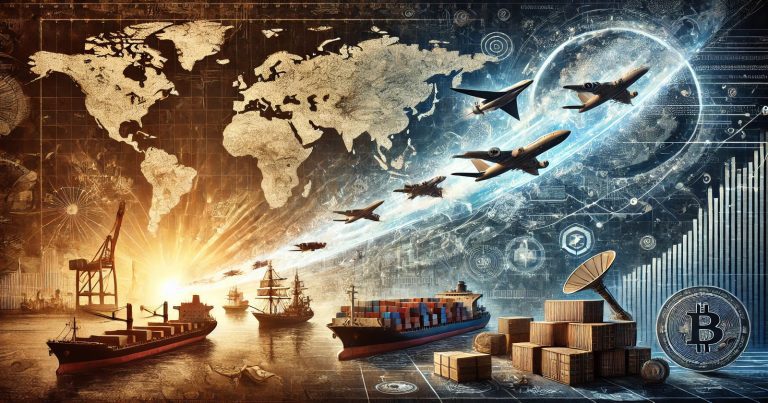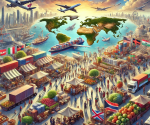The evolution of international business is synonymous with how trade and commerce have changed through centuries, driven by economic, technological, or political changes. From ancient bartering systems to today’s digital economy, international business has constantly evolved with the market’s demands. This process of evolution for international business has passed through varying phases – from easy trade routes to complex global supply chains.
Global trade has been instrumental in boosting growth in economies over the centuries. The phases of international business trace how firms penetrated beyond national borders and welcomed globalisation. Modern international business encompasses MNCs, e-commerce, and information technologies. In this sense, knowledge about international business development gives insights into tracing future trade patterns and global economic policy directions.
What is International Business?
International business is a cross-border exchange of goods, services, capital, and knowledge. It comprises trade, foreign investment, outsourcing, and multinational operations. Industrialization, technological progress, and economic integration have altered the course and character of international business evolution.
Key Aspects of International Business
- Export and Import – Companies move goods and services across borders.
- Foreign Direct Investment (FDI) – Companies invest in businesses in other countries.
- Licensing and Franchising – Companies allow foreign businesses to use their brand or technology.
- Joint Ventures and Mergers – Businesses form partnerships to expand globally.
Importance of International Business
- Expands market opportunities for companies.
- Increases employment and economic growth.
- Increases innovation and competition.
- Improves international trade relationships.
Evolution of International Business
The earliest form of international business can be traced back to ancient civilisations. Trade between regions began through barter systems, exchanging goods without money. The expansion of trade routes helped civilisations connect and share resources.
The Role of Ancient Civilizations in Trade
Several ancient civilisations played a crucial role in shaping early international business.
- Mesopotamia and Egypt: These civilisations traded gold, spices, and textiles through land and sea routes.
- Indus Valley and China: The trade between these two regions was significant, as the Silk Road, connecting Asia and Europe, helped to establish them.
- Greek and Roman Empires: Their expansions brought organised markets, money, and banking.
- Silk Road and Maritime Spice Route, ancient routes, formed the base of international business today.
Essential Characteristics of Ancient Trade
- Barter: No money but exchange of goods.
- Slow transportation: Trade was confined because travelling took a long time.
- Less government involvement: Rulers controlled trade routes but did not regulate commerce highly.
These early trade networks later developed into more structured economic systems that began the evolution of international business operations.
Medieval Period and the Emergence of Merchant Guilds
International Business in the medieval period (5th to 15th century) was the expansion of trade over local markets. This period’s international business development can be attributed to trade guilds, financial institutes, and well-organized markets.
Expansion of Trade Networks
- Silk Road: More numbers of traders began to engage themselves in long-distance trade from Asia and Europe
- Arab and Indian Trade Network: Arab musicians played a massive role in Asian, African, and European trade chains.
- The emergence of trade hubs: Venice, Constantinople, and Delhi emerged as trading cities.
Role of merchant guild
Merchants were groups of guild traders who regulated business activities in medieval Europe. He maintained the standard for weight, measures and trading patterns to preserve fair trade.
The banking system also developed, with merchants using bills of exchange to facilitate international transactions.
Impact of Medieval Trade on International Business
- Growth of financial institutions (banks, credit systems).
- Early corporations arise, and business contracts rise in demand.
- Asia and the Middle East demanded luxury goods.s
In the medieval period, there was a development in international trade that read economies for the industrial revolution through a structured trade network.
Industrial Revolution and Expansion of Global Trade
The Industrial Revolution marked a significant turn in international trade operations during the 18th and 19th centuries. New technologies and systems of mass production with transportation created more room for business expansion globally.
Main Technological Inventions
- Steam engines and rail: Allowed rapid movement of products
- Factories and mechanical manufacturing: Provided larger scales of production
- Telegraph and improved communication: Faster decision-making
Impact on International Trade
- Mass manufacturing has brought low costs to products.
- Demand for raw materials began increasing around the globe
- Businesses with multi-nationality started emerging.
Britain, Germany, and the United States mainly dominated this process of international business evolution in this period. Other important factors which contributed to the development of global commerce were colonial trade policies.
20th Century: Globalization and Trade Liberalization
In the 20th century, there was tremendous growth in trade, finance, and business. Governments and other international bodies established policies for facilitating global trade.
Impact of World Wars on Trade
- WWI (1914-1918): Trade fell owing to political stress.
- WWII (1939-1945): Economic rebuilding occurred due to post-war revival.
- Bretton Woods System (1944): The IMF and World Bank were founded during this period.
Growth of Multinational Corporations
- In the mid-20th century, multinational companies started penetrating several countries. Some of the significant events of this period include:
- American and European companies entered the world markets.
- Global supply chains and outsourcing were developed.
- Free trade agreements were created.
Role of Technology in International Business
The impact of technology mainly determined international business in the 20th century. Developments like the internet, telecommunications, and automation enabled businesses to function more effectively.
21st Century: Digital Revolution and E-Commerce
The 21st century changed how technology, e-commerce, and digital globalisation evolve international business operations. Companies now have a facility to do business in multiple countries without any physical presence.
Rise of E-Commerce and Online Business
- Most companies that sustain themselves online involve trade with these firms: Amazon, Alibaba, and eBay.
- Digital payment systems, through PayPal, cryptocurrency, and mobile banking, have reduced the complexity of cross-border transactions.
- Businesses use AI and data analytics to understand global market trends.
Globalisation and Changing Trade Policies
- Free trade agreements have been made in the form of NAFTA and the European Union trade policies that reduced the barriers in trade.
- Companies use sustainability and ethical sourcing to fulfil the world’s environmental concerns.
- Due to digital marketing and remote work, businesses have expanded their reach without physical offices. In the digital age, international business has developed from traditional trade to technology-based commerce.
Factors Influencing the Evolution of International Business
There are several reasons why international business development has been affected. This is because various motives explain the global expansion by firms.
Technological Change
In the evolution process of international business, technology serves a vital purpose: efficiency improvement, communication enhancement, and transportation facilitation.
- Internet and E-commerce
- Global buyers connect with global sellers in online markets.
- Digital Payments
- Mobile banking and cryptocurrencies ensure that transactions cross borders.
- Supply Chain Automation
- AI and robotics optimise manufacturing and logistics.
Economic Policies and Trade Agreements
The government also deals with international business regarding its trade policies and agreements.
- Free Trade Agreements (FTAs) typically lower tariffs and ease international trade.
- Foreign Investment Policies: Controls foreign direct investment.
- Taxation and Regulations: Affects the operations of a multinational business.
Globalisation and Market Development
Globalisation allows companies to venture into new markets- competition and innovation are rising.
- Outsourcing and Offshoring: Organizations save costs by relocating to cheaper regions.
- Cultural Accommodation: Organizations modify products to meet the tastes of local customers.
- Emerging Markets There is growth in areas such as China, India, and Africa.
Political and Social Factors
Political stability and cultural differences affect the choices in international business. Government policies influence trade restrictions, labour laws, and business regulations.
- Consumer behaviour varies in every region, so businesses have to adapt.
- Environmental concerns impact corporate sustainability efforts.
- Understanding these factors helps businesses develop strategies for global expansion.
Challenges and Future Trends in International Business
International business has grown, but challenges that affect its future direction still exist.
Challenges in International Business
- Trade Barriers: Tariffs, quotas, and restrictions are used to restrict free trade.
- Cultural Differences: Businesses need to adapt to changing consumer tastes
- Economic Crises: Global trade suffers from recession and inflation
- Cybersecurity Risks: The digital trade faces hacking and loss of data
Future Trends in International Business
The future international business operations would be dictated by the trends as follows:
Blockchain Technology: This technology provides secured transactions and a transparent supply chain.
- Artificial Intelligence (AI): Businesss analytics and automated customer service through AI.
- Green Business Practices: Sustainability and eco-friendly trade policies.
- Remote Work and Virtual Offices: Companies operate globally without physical presence.
The future development of international business is technology-driven solutions, digital transformation, and ethical trade.
Evolution of International Business FAQs
1. What is International Business?
International business deals with the cross-border trade, investments and commerce among nations. It entails exports, imports, multinational firms, and e-businesses.
2. Describe the historical development of international business.
The historical development of international business begins with ancient trade.It expanded through the Industrial Revolution,and spread across the 20th century with globalisation.Finally transformed into digital commerce in the 21st century.
3. What are the evolution stages of international business?
The ancient barter trade, medieval merchant guilds, industrial revolution expansion,globalisationn in the 20th century, and digital commerce in the modern era are classified under the stages of international business evolution.
4. How is technology impacting international business?
With the use of technology, international trade has speeded up cost-efficiently and efficiently. The evolutionary development of a global business operation is attributed to e-commerce, digital payments, AI, and automation.
5. What is the process of evolution of international business?
The evolution of international business includes the expansion of trade, the development of financial markets, globalisation, and digital transformation. The businesses have changed from physical markets to online markets.


